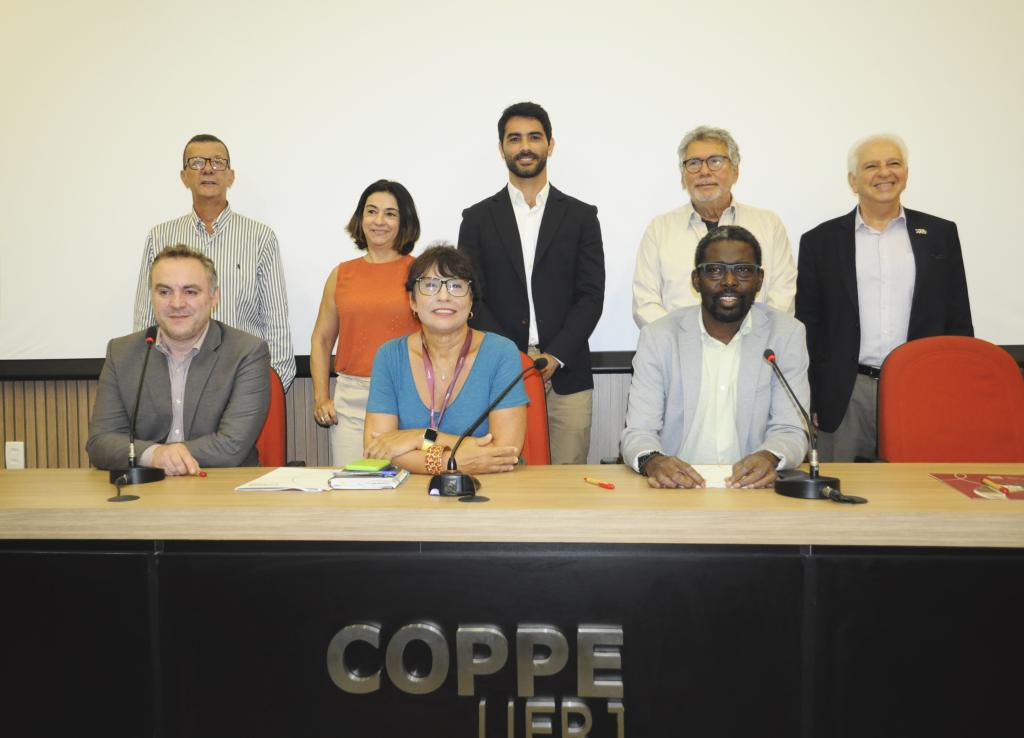Coppe and ORE Catapult sign agreement on offshore wind energy
Planeta COPPE / Blue Economy / Energy / Low Carbon / Ocean Engineering / News
Date: 26/03/2025

UFRJ, through Coppe, and the British company ORE Catapult signed, this Monday, March 24th, a memorandum of understanding for research and development in the offshore wind energy sector. The agreement was formalized during the Brazil-UK Workshop on Offshore Wind, an event which is part of a joint project funded by the UK Department for Science, Innovation and Technology (DSIT).
The main focus of the agreement is to develop a pilot project: a floating concrete platform designed to support a 15MW turbine. This project is being developed at Coppe by the Renewable Ocean Energy Group (Gero), which was presented by professor Milad Shadman from the Ocean Engineering Program (PEnO). The project encompasses the development of the constructive method for these structures, the use of artificial intelligence and Digital Twin in operation and maintenance, as well as the production of hydrogen from offshore wind energy.
Coppe’s director, professor Suzana Kahn, complimented the partnership and highlighted the similarities between Coppe and ORE Catapult. “We’re deeply involved with renewable energy, especially offshore. For this reason, I believe we shall have a lot to accomplish together in the following years” she stated.
David Findlay, Senior Project Development Manager at ORE Catapult, also welcomed the signing of the agreement: “It is great to have this opportunity to formalise this partnership. There are many synergies between Coppe and ORE Catapult, and I am sure that many opportunities will arise for us to work together to find solutions to the challenges of this sector” he said.
ORE Catapult, as highlighted by Findlay, is an innovation accelerator that has major laboratory facilities, such as the Levenmouth Demonstration Turbine, the Floating Offshore Wind Centre of Excellence and the New and Renewable Energy Centre. The institution operates test facilities valued at £1.4 billion and maintains important international research partnerships, such as the Floating Wind Technology Research Association (Flowra) and the Floating Wind Supply Chain Acceleration Programme (Flowb), which aims to accelerate the industry’s supply chain. “ORE Catapult was the first institution to sign an agreement with Flowra, an association created in Japan to reduce risks and costs in the development of floating wind energy technologies. I believe that Brazil and Coppe could join this initiative as well,” suggested Findlay.
In addition to Findlay, ORE Catapult representatives Edvaldo Mendes and Ben Moverley-Smith presented short, medium and long-term plans for the institution.
The signing of the memorandum was also attended by other authorities, such as Coppe’s Director for Technology and Innovation at UFRJ, Professor Marysilvia Costa, and Professors Segen Estefen and Carlos Levi, from the Ocean Engineering Program. Also present on the UFRJ side were Professor Papa Matar Ndiaye, Superintendent of International Relations, and Professor Milad Shadman himself.
ORE Catapult is part of a network of eight Innovate UK technology and innovation centers, with an investment of £1 billion, both public and private. Focused on offshore wind, wave and tidal energy, ORE Catapult conducts priority research and collaborates with industry, government and academia to reduce the cost of offshore renewable energy.
Furthermore, the strengthening of relations between Brazil and the United Kingdom in the offshore wind energy sector was addressed at a recent event in Brasília. The previous week, Professor Milad Shadman and Professor Marysilvia Costa participated in the Brazil-UK Forum on Offshore Wind Energy. The event featured lectures by representatives of the Brazilian and British governments, addressing topics such as regulation, socioeconomic impacts and challenges related to energy transmission and distribution.
A significant achievement for Coppe was the appointment of Professor Milad Shadman by the Department of Energy Transition (DTE) of the Ministry of Mines and Energy to join the working group on offshore wind energy. This group will be responsible for defining the next steps in the development of the sector in Brazil, further highlighting UFRJ’s leading role in research and innovation in renewable energy in the country.
- Blue Economy
- Innovation
- Offshore Wind Energy
